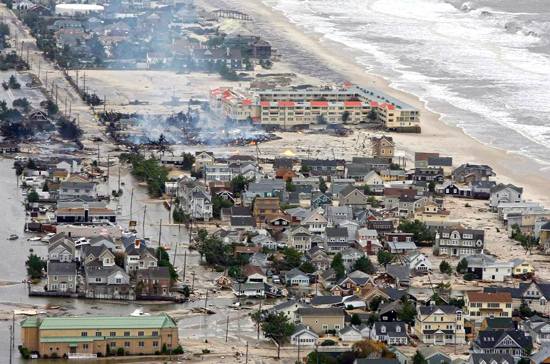We shouldn’t need Sandy to remind us that time is running out to reduce global carbon emissions. [6 November 2012 | Peter Boyer]

Storm damage on the New Jersey coast, 30 October 2012. PHOTO TIM LARSEN / NEW JERSEY GOVERNOR’S OFFICE
It takes a lot to stop a US presidential election campaign dead in its tracks. Last week’s apocalyptic storm that laid waste to much of the north-eastern United States did just that, and more besides.
President Barak Obama opted out of the campaign to head up his government’s disaster response, while Republican challenger Mitt Romney felt obliged to show sympathy for victims by suspending his own campaigning for a couple of days.
In the process, man-made climate change found its way back into the US public domain, perhaps not too late to have a small electoral impact. What a shame it took such a disaster to shift attention away from lesser matters.
Before my critics blow a fuse, I’m not putting super-storm Sandy down to man-made climate change, though science has a plausible argument for doing so.
Over the past week, meteorologists have cited science that links Sandy to a shifting circumpolar jet stream, a result of a warming Arctic, that has blocked the easterly passage of Atlantic weather systems. This makes sense, but like so much about extreme weather, it’s no open-and-shut case.
I don’t want to focus on what made Sandy into a once-in-a-century storm, but on the dangerously disconnected dream-world of power politics and big money.
For all the bluster to the contrary, the case for the world to focus urgently on global warming is beyond dispute. A vast array of evidence from many years of scientific observation and analysis carries all the weight that we need to act. We don’t need Sandy to tell us that.
But power politics and big money are somewhere else altogether. Maybe the people engaged in these games spend too much time indoors. If this freak weather event was able to get them thinking about climate for more than a millisecond, who am I to object?
In every presidential campaign since 1988, climate change has figured in the formal debates — until now. It didn’t rate a mention by either of the two main protagonists until after the debates were over, when Obama fielded questions from young viewers in an MTV interview.
“Samantha of New Jersey” probably had the prospect of Sandy’s imminent New Jersey landfall in mind when she asked Obama what he would do to make global climate change a priority.
There was little to cheer about in Obama’s response. Climate change was a critical issue, he said. “I believe scientists who say we are putting too much carbon emissions into the atmosphere and it’s heating the planet and it’s going to have a severe effect.”
He admitted “we’re not moving as fast as we need to” before citing his administration’s measures to improve car fuel efficiency and increase clean energy production. Future priorities included energy-efficient building codes and help for developing countries to build their own clean technologies.
That’s it. No measures to discourage fossil fuel extraction or to put a price on carbon; no discussion of changes to patterns of transportation; nothing about agriculture and food production. In other words, no indication that he really grasps the full extent of what has to be done.
But that’s the good news. On the other side of the election divide sits Republican aspirant Mitt Romney, and from here the story only gets worse.
Romney himself says he doesn’t know what causes climate to change, the position you take when you don’t want to do anything. But that pales into insignificance when the spotlight is put on the people who, backed by big business, shaped the thinking and direction of his campaign. Their most visible expression is the mindless anger of the Tea Party movement.
In his MTV interview, Obama said he was “surprised” that climate had not been a campaign topic. He shouldn’t have been. Man-made global warming has been off the agenda because Americans with political ambitions know that to even hint that it’s valid may be an act of political suicide.
Take the case of former South Carolina congressman Bob Inglis, a solid Republican conservative who thought decades of party service had earned him a right to speak his mind. When he said he supported action to cut emissions, his own party refused to endorse him for re-election in 2010.
After his primary loss, Inglis told David Corn of the online journal Mother Jones that Republican colleagues knew “deep down” that they needed to adopt measures to cut carbon emissions, but were being herded by the “hot microphones” of radio and TV shock-jocks, “like flame throwers causing people to run with fear and panic”.
The campaign against climate action is a cynical exercise in disinformation. The well-funded lobbyists behind it — people like Myron Ebell, a policy director for the Competitive Enterprise Institute — seem immune to the charge that they’re getting short-term gain from long-term pain.
There are chinks in the armour. “What if you’re wrong?” Ebell was asked in an interview for the PBS pre-election documentary Climate of Doubt. “Then I’ll have to say I’m sorry,” said Ebell, “and I wish we could do something to speed up our efforts to reverse the policies that we have supported.”
Saying sorry and wishing for better won’t be enough, but it would be an improvement on what Ebell and his many colleagues are currently up to. Until reality overtakes the campaigns of these people and their backers, all of us — in Australia as in the US — are in for plenty more mischief.
Today is decision day for Americans. May their chosen leader have the courage to stand up for sanity, and move with all due speed to lead his country and the world out of the mad, dark, deluded world of climate denial.
